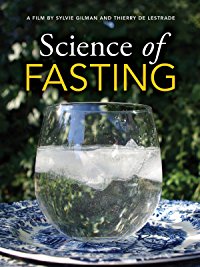Science of Fasting, directed by Sylvie Gilman, Thierry de Lestrade
–Review by Ashley Linne
Since we are in the season of Lent, this documentary seemed to be fitting. Fasting is a spiritual discipline that people have practiced for centuries, but until recently Western science has largely ignored its benefits. This intriguing documentary briefly examines the physically healing powers of fasting.
The film is only about an hour long but in that time presents some very interesting information about the science of fasting. Many people who fast for long periods of time experience euphoria after the first few days, so one could wonder if the healing benefits are a placebo effect. The filmmakers visit a few different inpatient treatment centers and research facilities around the world to explore the health benefits of fasting and how it works on a cellular level.
Most people who visit the treatment centers will do a water-only fast for about 12 days, under direct medical supervision. Patients may also exercise and receive other treatments such as massage. The majority report that their symptoms and health conditions improve with fasting and some even resolve completely. The film also explores the effect of fasting on cancer cells, including how cells respond to chemotherapy.
A researcher at USC did an experiment among mice with cancer. One group of mice fasted for 48 hours before receiving a potentially lethal dose of chemotherapy and the other group did not fast before receiving it. All the ones who fasted lived, and the others died. Apparently, cancer cells can’t go into the protective mode that healthy cells do under the stress of fasting.
Fasting is a way to cleanse the body and focus the mind. People from various faiths and backgrounds utilize fasting as a spiritual discipline, but now many people are looking into it for the health benefits. Ketogenic diets and intermittent fasting are growing trends among even those who aren’t looking for any sort of spiritual experience.
This film shows that when it comes to food, our bodies are better equipped to deal with inadequacy than excess, and as such our bodies seem to be built for occasional fasting. Perhaps, as the narrator says in the film’s closing moments, we’ve been “programmed to cope with deprivation.” But the fast is always broken—otherwise death would follow.
As we are in this season of Lent or any other season of seeming deprivation, may we be open to the experience of transformation within His power, knowing that when the fast ends we will be entering a new season of resurrection and life.

